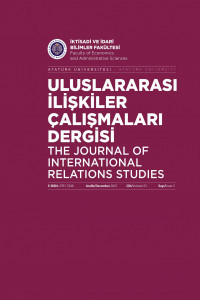USA – RUSSIA RELATIONS IN THE OBAMA PERIOD: REFLECTIONS OF RESET POLICY
USA – RUSSIA RELATIONS IN THE OBAMA PERIOD: REFLECTIONS OF RESET POLICY
The main theme of the article is the reset policy by which USA put forward her relations with Russia during the Obama era, and which constitutes a process of rapprochement in bilateral relations. In addition, the research question discussed in the article, to what extent has the reset strategy succeeded in USA-Russia relations? The reset strategy, which revealed a process of convergence in military, political and economic issues in bilateral relations, also played an important role in Russia's process of becoming a rising power. In this context, serious steps have been taken on issues such as disarmament, Iran's nuclear program, missile defense systems and cooperation in the fight against terrorism. The USA and Russia, which took joint measures against countries such as Afghanistan and North Korea, turned to a global cooperation process. However, Putin's return to the presidency in 2012 marked the beginning of the end of the zero policy. Particularly in the South Caucasus, the Middle East and Ukraine, a period of great disagreement with the USA has been entered. The annexation of Crimea in 2014 was the last spark that caused the USA to abandon the reset policy to a large extent.
Keywords:
Barack Obama, Reset Strategy, Russia, Cooperation Rising Power,
___
- Aristova, M. (2013). US-Russia Relations of Reset: Results and Perspectives. Research Institute of European and American Studies (RIEAS), http://www.rieas.gr/research-areas/global-issues/russian-studies/2048-usrussia-relations-of-reset-results-and-perspectives.html.
- Blank, S. (2014). “Beyond The Reset Policy: Current Dilemmas Of U.S. – Russia Relations”. Comparative Strategy, 29(4), 333 – 367. Charap, S. (2009). Beyond The Reset Button. Foreign Policy and Security. https://www.amercanprogress.org/ssues/securty/news/2009/05/20/6032/beyond-the-reset-button/.
- Charap, S. (2010). Assessing The “Reset” and The Next Steps For U.S. Russia Policy. Center For American Progress, https://www.americanprogress.org/wp-content/uploads/issues/ 2010/04/pdf/russia_report.pdf.
- Cohen, A. (2010). Time to Revise Obama’s Russian ‘Reset’ Policy. The Heritage Foundation, http://www.heritage.org/research/reports/2010/10/time-to-revise-obamas-russian-reset-policy.
- Cohen, S. F. (2011). Obama’s Russia ‘Reset’: Another Lost Opportunity. The Nation, https://www.thenation.com/article/archive/obamas-russia-reset-another-lost-opportunity/.
- Deyermond, R. (2012). “The Republican Challange to Obama’s Russia Policy”. Survival, 54(5), 67 - 92.
- Dilek, M. S. (2019). “Obama Döneminde Amerika Birleşik Devletlerinin Ulusal Güvenlik Stratejisi”. II. Uluslararası Giresun Güvenlik Sempozyumu Bildiri E- Kitabı, 35 – 48.
- Efegil, E. (2008). “Bush Doktrini ve Dünya Güvenliğine Etkileri”. Hacettepe Üniversitesi Türkiyat Araştırmaları, 8, 103 – 122.
- Fedunyak, S. (2014). Putin’s Doctrine” As a Threat to the International System. Wilson Center, https://www.wilsoncenter.org/article/putins-doctrine-threat-to-the-international-system.
- Goldgeier, J. M. (2009). Obama Calls Arms Treaty a Priority. Hoover Institution, http://www.hoover.org/publications/policy-review/article/5474.
- Kandemir, E. (2011). “ABD Başkanları G. W. Bush ve B. Obama Dönemlerinde Yayımlanan Ulusal Güvenlik Stratejilerinde İttifak Söylemleri ve S. Walt’un İttifak Teorisi”. Savunma Bilimleri Dergisi, 10(2), 122 – 151.
- Khalifazadeh, M. (2014). “The Obama Administration’s Russia “Reset” Policy and The Southern Caucasus”. Central Asia and The Caucasus, 15(3), 78 – 91.
- Kramer, D. J. (2010). U.S. Abandoning Russia’s Neighbors. The Washington Post, https://www.washingtonpost.com/wp-dyn/content/article/2010/05/14/AR2010051404496 .html.
- Kuchins, A. C. (2016). Elevation and Calibration: A New Russia Policy For America. Washington: Center On Global Interests.
- Kuchins, A. C. and Zevelev, Igor A. (2012). “Russian Foreign Policy: Continuity in Change”. The Washington Quarterly, 35(1), 147 – 161.
- Medvedev, D. (2009). Address to the President of Ukraine Victor Yushchenko. President of Russia Website, http://www.kremlin.ru/eng/text/docs/2009/08/%20220759.shtml.
- Michta, A. A. (2014a). U.S. Needs New Bases in Central Europe. American Interest, https://www.the-american-interest.com/2014/06/11/u-s-needs-new-bases-in-central-euro pe/.
- Michta, A. A. (2014b). A Strategy For Eurasia. American Interest, https://www.the-american-interest.com/2014/04/14/a-u-s-strategy-for-eurasia/.
- Migranyan, A. (2009). Moscow’s Iran Connection. National Interest, http://www.nationalinterest.org/Article.aspx?id21982.
- Ondrejcsak, R. (2016). “U.S. Policies Towards Russia in The Light of War in Ukraine: From Engaging a “Cooperative Power” to Defensive Containment of Regional Challanger”. Security Studies, 13 – 26.
- Philipps, M. (2010). The New Start Treaty and Protocol. The White House Blog, http://www.whitehouse.gov/blog/2010/04/08/new-start-treaty-and-protocol.
- Pifer, S. (2015). “US-Russia Relations in the Obama Era: From Reset to Refreeze?”. OSCE Yearbook, 111 – 123.
- Rice, C. (2014). Will America Heed The Wake – Up Call Of Ukraine?. The Washington Post, https://www.washingtonpost.com/opinions/condoleezza-rice-will-america-heed-the-wake-up-call-of-ukraine/2014/03/07/cf087f74-a630-11e3-84d4-e59b1709222c_story .html.
- Rojansky, M. and Collins, J. F. (2010). “A Reset For The U.S. – Russia Values Gap”. Carnegie Endowment For International Peace, 1(1), 1 – 16.
- Sestanovich, S. (2008). “What Has Moscow Done?: Rebuilding U.S. – Russia Relations”. Foreign Affairs, 87(6), 12 – 28.
- Spiegel, P. (2009). Biden Says Weakened Russia Will Bend to U.S.. Wall Street Journal, http://online.wsj.com/article/SB124848246032580581.html.
- Stent, A. (2014). The Limits Of Partnership. Oxford: Princeton University Press.
- Stolberg, S. G. (2010). Obama Calls Arms Treaty a Priority. New York Times, http://www.nytimes.com/2010/11/14/world/europe/14diplo.html].?ref=us.
- Suslov, D. (2015). US-Russia Relations In The Early and Late 1990s. Moscow: Faculty Of World Economy and International Affairs - Higher School of Economics.
- The White House (2010). U.S.-Russia Relations: “Reset” Fact Sheet. https://obamawhitehouse.archives.gov/the-press-office/us-russia-relations-reset-fact-sheet.
- The White House (2014), Fact Sheet: U.S. Support and Reassurance Initiatives For The Baltics and Central Europe, https://obamawhitehouse.archives.gov/the-press-office/2014/09/03/fact-sheet-us-support-and-reassurance-initiatives-baltics-and-central-eu.
- Trenin, D. (2009). Russia’a Spheres of Interest not Influence. The Washington Quarterly, http://www.twq.com/09october/docs/09oct_Trenin.pdf.
- Ulyanov, I. (2015). Assessing The Obama – Medvedev Reset in US – Russia Relations. E – International Relations, https://www.e-ir.info/2015/09/03/assessing-the-obama-medvedev-reset-in-us-russia-relations/.
- Wezeman, P. (2013). Armaments, Disarmaments and International Security. SIPRI Year Book, http://www.sipri.org/yearbook/2013/files/sipri-yearbook-2013-chapter-5-section-3.
- Yılmaz, B. (2019), Barack Obama’nın İkinci Başkanlık Döneminde Türk – Amerikan İlişkileri (Yayımlanmamış Yüksek Lisans Tezi). Ankara: Yıldırım Beyazıt Üniversitesi Sosyal Bilimler Enstitüsü.
- Zygar, M. (2016). The Russian Reset That Never Was. Foreign Policy, https://foreignpolicy.com/2016/12/09/the-russian-reset-that-never-was-putin-obama-medvedev-libya-mikhail-zygar-all-the-kremlin-men/.
- Başlangıç: 2021
- Yayıncı: Atatürk Üniversitesi
Sayıdaki Diğer Makaleler
THE CHINESE MODEL OF CYBER SOVEREIGNTY: MAIN PRINCIPLES AND IMPLEMENTATIONS
USA – RUSSIA RELATIONS IN THE OBAMA PERIOD: REFLECTIONS OF RESET POLICY
TURKEY AND NATO: QUESTIONING THE SOLIDARITY
Mehmet Seyfettin EROL, Şafak OĞUZ
EUROPEANIZATION OF TURKEY’S RELATIONS WITH GREECE
ULUSAL, BÖLGESEL VE KÜRESEL GÜÇ MÜCADELESİ BAĞLAMINDA İRAN’IN SURİYE İÇ SAVAŞI’NDAKİ ROLÜ
